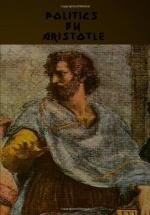
|
| Name: _________________________ | Period: ___________________ |
This test consists of 15 multiple choice questions and 5 short answer questions.
Multiple Choice Questions
1. A correct constitution is conductive to the creation and implementation of what?
(a) Just rulers.
(b) Just citizens.
(c) Just states.
(d) Just laws.
2. Phaleas of Chalcedon proposed that property should be divided how?
(a) According to status in society.
(b) According to familial needs.
(c) Rather evenly.
(d) Unevenly.
3. What does Aristotle calls the pool from which oligarchies draw their officials?
(a) Inherited positions.
(b) Politically powerful.
(c) Power-groups.
(d) Political elite.
4. The first of Aristotle's two arguments about force and governance says that "might is ______."
(a) Not right.
(b) Against the weak.
(c) Right.
(d) For the powerful.
5. Aristotle says there are two things a ruler must be concerned with: the population and what?
(a) Warriors.
(b) Territory.
(c) Resources.
(d) Buildings.
6. How long has Aristotle's "Politics" been around?
(a) Over two millenia.
(b) Over five millenia.
(c) Over four millenia.
(d) Over three millenia.
7. Aristotle says that slaves belong to whom?
(a) No one.
(b) Their masters.
(c) God.
(d) Themselves.
8. What is the basic unit of society for Aristotle?
(a) Village.
(b) State.
(c) Family.
(d) Pair.
9. The text of Aristotle's politics is divided into what?
(a) Parts.
(b) Divisions.
(c) Letters.
(d) Books.
10. In relationship to food, Aristotle says that is better to be what, than cash rich?
(a) Have plenty of food and be generous.
(b) Have plenty of food and cash neutral.
(c) Have plenty of food and cash poor.
(d) Have plenty of food and give to the poor.
11. According to Aristotle, the end in a democracy is the best interests of whom?
(a) The rich.
(b) The poor.
(c) The middle class.
(d) The individual.
12. Aristotle says that when an increase in free populace is needed, or when a state is new, there may be lax rules about what?
(a) Who can hold office.
(b) How to be a citizen.
(c) Freeing slaves and women.
(d) Who can hold property.
13. Aristotle believes that anyone who is found with exceptionally high virtue will be encouraged to be what?
(a) The tyrant.
(b) The kind.
(c) The ultimate judge.
(d) The general.
14. Aristotle believes that the ruler must have the virtue of being able to create the desired result, which is defined as what?
(a) Increase in prestige for the state.
(b) Increase in resources for the state.
(c) Good conditions for the entire state.
(d) Continued survival of the state.
15. Aristotle thinks the best kind of rulership is what?
(a) Semi-permanent.
(b) Permanent.
(c) Periodic.
(d) Temporary.
Short Answer Questions
1. Who felt that women should be warriors, just like the men?
2. The second introduction tells the reader that some of Aristotle's opinions might be met with what?
3. What name does Aristotle give the class that are fighters and legislators?
4. Aristotle says that in order to receive the full load of privileges and obligations related to being a citizen, a person must what?
5. What is one of the two options that Aristotle says can describe "education for productive labor?"
|
This section contains 463 words (approx. 2 pages at 300 words per page) |

|




